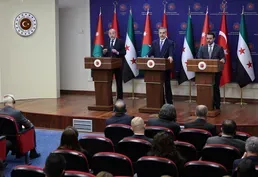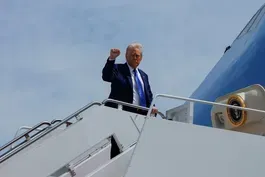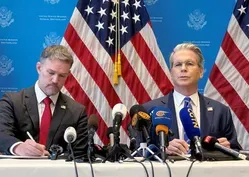
White South Africans granted refugee status in U.S.
Clip: 5/12/2025 | 5m 57sVideo has Closed Captions
White South Africans arrive in U.S. after receiving refugee status from Trump
Nearly 60 white South Africans were admitted into the U.S. as part of President Trump’s resettlement program. Afrikaners, largely descendants of Dutch and French colonial settlers, led the apartheid government until it ended. The White House claims a new South African law is racist and the white minority is being persecuted. Amna Nawaz discussed more with Bill Frelick of Human Rights Watch.
Problems with Closed Captions? Closed Captioning Feedback
Problems with Closed Captions? Closed Captioning Feedback
Major corporate funding for the PBS News Hour is provided by BDO, BNSF, Consumer Cellular, American Cruise Lines, and Raymond James. Funding for the PBS NewsHour Weekend is provided by...

White South Africans granted refugee status in U.S.
Clip: 5/12/2025 | 5m 57sVideo has Closed Captions
Nearly 60 white South Africans were admitted into the U.S. as part of President Trump’s resettlement program. Afrikaners, largely descendants of Dutch and French colonial settlers, led the apartheid government until it ended. The White House claims a new South African law is racist and the white minority is being persecuted. Amna Nawaz discussed more with Bill Frelick of Human Rights Watch.
Problems with Closed Captions? Closed Captioning Feedback
How to Watch PBS News Hour
PBS News Hour is available to stream on pbs.org and the free PBS App, available on iPhone, Apple TV, Android TV, Android smartphones, Amazon Fire TV, Amazon Fire Tablet, Roku, Samsung Smart TV, and Vizio.
Providing Support for PBS.org
Learn Moreabout PBS online sponsorshipAMNA NAWAZ: Today, nearly 60 white South Africans were admitted into the United States.
It's part of President Donald Trump's resettlement program for white Afrikaners, largely descendants of Dutch and French colonial settlers in South Africa.
Afrikaners also led the racist apartheid government there until it ended in 1994.
Today, the White House alleges that a new South African law which redistributes unused land to the state is racist and that the white minority is being persecuted by the Black-led government.
President Trump even halted all aid to South Africa back in February.
Applications from these white families were fast-tracked by the administration, even as it suspended the U.S. refugee resettlement program, leaving thousands of approved refugees worldwide stranded.
Joining us now is Bill Frelick, the head of the Refugee and Migrants Rights Division at Human Rights Watch.
Bill, welcome to the "News Hour."
BILL FRELICK, Refugee and Migrant Rights Division Director, Human Rights Watch: Good to be here.
AN So President Trump was asked about the classification of these families as refugees.
Here's what he had to say about conditions in South Africa.
DONALD TRUMP, President of the United States: It's a genocide that's taking place that you people don't want to write about, but it's a terrible thing that's taking place.
And farmers are being killed.
They happen to be white, but whether they're white or Black makes no difference to me, but white farmers are being brutally killed, and their land is being confiscated in South Africa.
AMNA NAWAZ: White farmers being brutally killed, their land being confiscated, what do you make of these allegations of white genocide, as the president has said, as we know Elon Musk has said before, and the classification of these families as refugees?
BILL FRELICK: Well, this is not actually supported from any of the information that we have seen.
The expropriation law that you mentioned only came into effect in January, and it is stated that it is for noncompensation for private land that would go into public hands if that land has been unused, if there's nobody living and working on that land or developing it.
And, so far, of course, none of that land has actually been taken.
So there have been homicide rates that are high rates in South Africa.
I think it was like 13,000 in 2023, but only single digits were farmers that were killed.
Now, you don't want anyone to be killed, and I don't want to disparage any one person's story, but we don't have the phenomenon of people fleeing the country, as we do with refugees all over the world.
There are about 38 million refugees in the world who, by definition, are people who have crossed an international border because they're fleeing persecution, they're fleeing war, they're fleeing conflict, and there are no Afrikaner refugee camps.
The U.N. High Commissioner for Refugees didn't refer any South Africans of any background, of any race, of any language for settlement in the last year.
So this is something really new and different from anything we have seen.
AMNA NAWAZ: And the families who arrived today were approved in a few months time.
We understand they're flown over on a State Department chartered flight.
Is that the usual process for refugee resettlement?
BILL FRELICK: No.
I mean, one, you often have refugees that have spent years and years in refugee camps.
And then out of the millions of refugees in the world, less than 1 percent are ever even referred for third country resettlement.
They have exhaustive vetting, security screening, health screening, screening to make sure that they actually do have a well-founded fear of being persecuted.
And they usually are people that have great difficulties in the country of first asylum.
They're people that have difficulties in the refugee camps in which they're living.
Maybe they're being persecuted in the country of first arrival as well.
So these are circumstances that you would assess on a case-by-case basis.
And that takes a long period of time to do.
This was done in three months.
And these are people that came directly from their country of origin.
They were not people that were living in refugee camps.
They were not people that were vetted by the U.N.
Refugee Agency or referred to the United States in the normal way.
And they were flown here in chartered planes paid for directly by the U.S. Usually, it's the International Organization for Migration that does travel loans that refugees are expected to pay back actually upon arrival.
AMNA NAWAZ: As we speak, we know the Trump administration has ended deportation protections for a number of countries, people from Afghanistan, Haiti, Sudan.
The refugee resettlement program, as we noted, has been halted.
It's very difficult to ignore the racial dynamics here.
White South Africans have been allowed in, while people from majority Black and brown countries have been kept out.
What do you see when you look at these policies?
BILL FRELICK: Clearly, there's a racial twist here.
When you see, again, going in the first Trump administration, where he described Haitians as coming from four-letter word countries, that he said he wanted people that looked like Norwegians to come to the United States.
And in 2018, long before the Russians had invaded Ukraine, under the first Trump administration, the group that he chose to increase the refugee numbers were Ukrainians, while there was a dramatic decrease, slashing of refugee numbers in Africa, in the Middle East, and in the rest of the world.
And so now we have seen a complete closing of the door, a total suspension of the refugee resettlement program for all refugees everywhere, and then, 18 days later, another executive order that privileges only white South Africans.
AMNA NAWAZ: Bill Frelick from Human Rights Watch, thank you for being here.
We appreciate your time.
BILL FRELICK: Thank you for having me.
Last living American hostage held in Gaza released by Hamas
Video has Closed Captions
Clip: 5/12/2025 | 9m 1s | Last living American hostage released by Hamas as Netanyahu plans for Gaza's reoccupation (9m 1s)
News Wrap: PKK will disband in peace deal with Turkey
Video has Closed Captions
Clip: 5/12/2025 | 6m 57s | News Wrap: PKK will disarm and disband in peace deal with Turkey (6m 57s)
Qatar gifting jet to Trump raises ethical and legal concerns
Video has Closed Captions
Clip: 5/12/2025 | 5m 8s | Qatar gifting Trump $400M luxury jet raises ethical and legal concerns (5m 8s)
Tamara Keith and Amy Walter on Trump's tariff negotiations
Video has Closed Captions
Clip: 5/12/2025 | 6m 52s | Tamara Keith and Amy Walter on Trump's tariff negotiations (6m 52s)
U.S. and China roll back tariffs as they try to reach deal
Video has Closed Captions
Clip: 5/12/2025 | 4m 55s | U.S. and China roll back steep tariffs as they try to reach a larger deal (4m 55s)
What's next for Trump's trade war after pausing tariffs
Video has Closed Captions
Clip: 5/12/2025 | 6m 45s | What's next for Trump's trade war after pausing tariffs with China (6m 45s)
What to expect after Trump demands lower drug prices
Video has Closed Captions
Clip: 5/12/2025 | 6m 33s | What to expect after Trump signs order demanding lower prices from drug companies (6m 33s)
Providing Support for PBS.org
Learn Moreabout PBS online sponsorshipSupport for PBS provided by:
Major corporate funding for the PBS News Hour is provided by BDO, BNSF, Consumer Cellular, American Cruise Lines, and Raymond James. Funding for the PBS NewsHour Weekend is provided by...


















